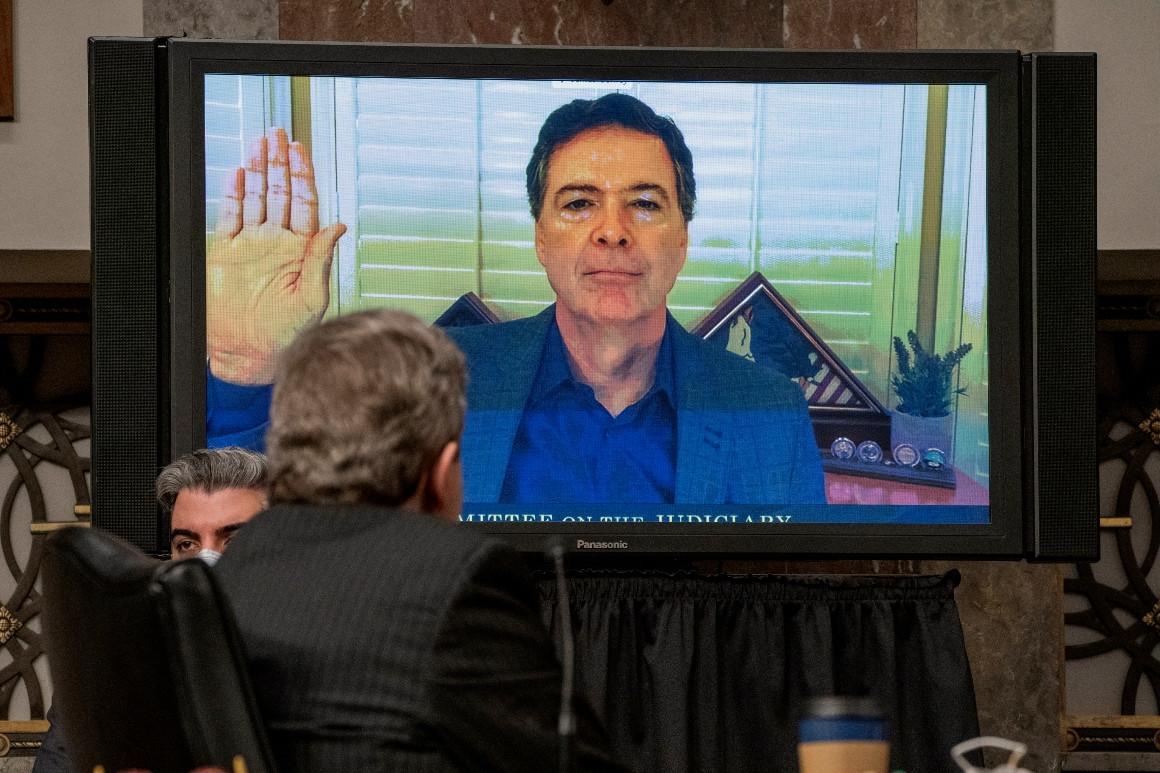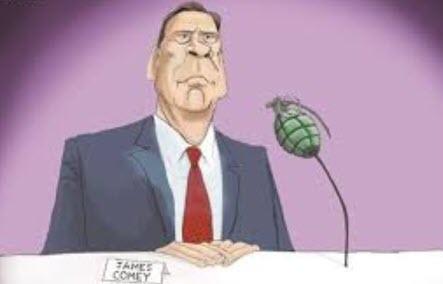What Rings Comey’s Bell: Former FBI Director’s Casual Testimony Confirms Worst Of His Tenure
Tyler Durden
Thu, 10/01/2020 – 13:50
In his long-awaited testimony before the Senate Judiciary Committee, former FBI Director James Comey’s testimony proved as casual as his appearance in an open shirt from his home office. Comey was hammered with embarrassing findings of errors under his watch in the handling of the Russian investigation, including the reliance on information that FBI agents warned might be Russian disinformation supplied by a Russian agent. After years of investigation, the FBI was unable to show that a single Trump official conspired or colluded with the Russians. Instead, investigations found extensive errors, irregular and criminal conduct, and statements of intense bias by key FBI figures.
Yet, Comey proceeded to give what amounted to a series of shrugs in either denying any recollection of such information or deflecting responsibility to others.
Comey was asked about an intelligence report suggesting that Hillary Clinton personally approved an effort “to stir up a scandal against U.S. Presidential candidate Donald Trump by tying him to Putin and the Russians’ hacking of the Democratic National Committee.” The report was reportedly sufficiently serious to be included in a briefing of President Barack Obama. However, when asked about his knowledge, Comey again shrugged and said it “didn’t ring a bell.” That’s it.
The fact is that the allegation against Clinton (like the one against Trump that launched the Russian investigation) was unverified and could be legitimately questioned. There is a fair question on why the FBI went all in on one allegation and not the other. When asked “did you have a duty to look at any allegations regarding Clinton in Russia?” Comey simply replied “I don’t know what you mean.”
Yet, the more interesting question is what exactly does “ring the bell” of James Comey. Recent disclosures have added to the very serious allegations of misconduct in the handling of the Russian investigation. Highly critical reports by the Inspector General and the secret FISA court detailed critical omissions and outright false information used as the basis for the investigation. This includes conduct leading to the firing of the top FBI officials and agents involved in the investigation and a recent criminal plea by the key FBI agent in charge of the FISA applications. Comey however seemed locked in some Kübler-Ross loop, stuck between denial and transference.
Comey did finally admit that, knowing what he knows today, he would not have signed off on the key secret surveillance targeting Carter Page. That makes it unanimous. Former acting Attorney General Sally Yates, Deputy Attorney General Rod Rosenstein and now Comey himself have all said that the application was invalid. Everyone agrees but no one is taking real responsibility.
Yet, Comey bizarrely said, while he would not have approved such surveillance today, he still did not think that he should have been informed (while considering the application containing Steele dossier information) that the source for the information was believed to be an actual Russian agent. Comey said that that was something that he did not really need to know:
“I’m not investigating the case…They’d want to wrestle with that [on the team] and decide what to do with it.”
So Comey was questioning the relevancy of his knowing that FBI agents believed that the Steele dossier (which was part of his briefing) was Russian disinformation and supplied by a Russian agent. That apparently would not “ring his bell” before signing a highly unusual application, including the Steele material, targeting a person close to the Republican presidential candidate in an investigation on Russian influence in the election.
It is part of Comey’s deeply conflicted self-image. Comey previously in his book on “ethical leadership” criticized Trump and said “a leader needs the truth, but an emperor does not consistently hear it from his underlings.” That apparently does not apply to being informed that secret surveillance might be based on false information, including Russian intelligence disinformation.
Comey also made a series of false statements. He repeated, for example, the long-standing denial that there was any surveillance of the Trump campaign. New information shows that the FBI used a briefing in August 2016 of then candidate Trump to gather information for “Crossfire Hurricane,” the Russia investigation. While Comey is still denying this fact, other Democrats have already moved on from the denial of any surveillance of the campaign. After the disclosure, Rep. Eric Swalwell declared that “they were right to do it.”
We now know that the FBI was warned early in the process that American intelligence believed that the Steele dossier, funded by the Clinton campaign, contained possible Russian disinformation. It also warned that the actual source for the most damaging allegations had told American intelligence that Steele misrepresented both his statements and his sources – treating effectively bar room gossip as hard intelligence. None of that seemed relevant to Comey in carrying out his duty to review the evidence in approving the investigation and secret surveillance. When confronted with the evidence that a shadowy professor named Joseph Mifsud was actually a Russian agent, Comey again just shrugged at the notion that the FBI had been used as chumps by Russian intelligence:
“I think the Intelligence Committee found that he was representing Russian interests in communicating with [Trump adviser George] Papadopoulos.”
After running through the long list of violations and errors in the Russian investigation, Comey was asked about his past public statements and writings dismissing all of these problems. He was specifically asked about a 2019 column in which he assured the public that they were all “lies.” Comey said that he stood by what he said in 2019. Yet, Comey declared in that column:
“But go ahead, investigate the investigators, if you must. When those investigations are over, you will find the work was done appropriately and focused only on discerning the truth of very serious allegations…Those are lies, and dumb lies at that.”
We did investigate and it didn’t find it was done appropriately. Comey himself admitted that he would now not signed the Page secret surveillance application and acknowledged all of the findings of errors by the various investigations. Figures like Rosenstein have called for continuing the investigation into the wrongdoing by the FBI. Few people, beyond Comey, are seriously arguing that the investigation were “done appropriately” and the allegations were not “lies,” let alone “dumb lies.”
Some things however clearly did ring Comey’s bell like the recent allegations against Trump or former National Security adviser Michael Flynn. While declining to comment on some of the new information on the Russian investigation or offering curt replies, Comey did not hesitate in holding forth on how reports of Trump’s taxes may show that he is under the control of Russia. It was precisely the concern of his critics that Comey’s interest in intelligence or evidence tended to tract his personal interest in the targets.
What Comey clearly wanted to talk about with Sen. Cory Booker (D., N.J.) was what he called the racist “radioactive stew” unleashed in recent years. Yet, Comey’s comments had a certain familiar ring. He explained how a failure of leadership or reckless public statements can encourage wrongdoing because “it gives [wrongdoers] license, and it makes them cool in the eyes of the people who make up that radioactive stew… it is a free pass to people that nobody wants in their communities.”
It may not ring any bells with Comey but that is precisely what he is accused of doing as director in the Russian investigation.

